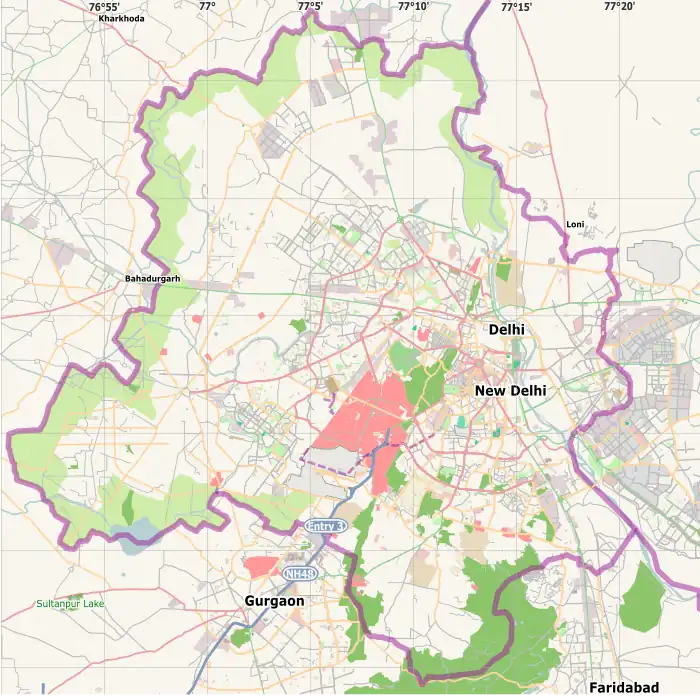| Tomb of Sikandar Lodi | |
|---|---|
.jpg.webp) Sikandar Lodi's tomb at Lodhi Gardens | |
| Type | Historic monument & mausoleum |
| Location | Lodhi Gardens |
| Coordinates | 28°35′46.5324″N 77°13′17.6340″E / 28.596259000°N 77.221565000°E |
| Built | 1517–1518 CE |
| Architectural style(s) | Islamic & Hindu architecture |
| Governing body | Archaeological Survey of India & NDMC |
| Owner | Government of Delhi |
| Official name | Sikandar Lodi's tomb |
| Designated | 9 April 1936 |
| Reference no. | N-DL-75 |
 Location of Tomb of Sikandar Lodi in Delhi | |
The Tomb of Sikandar Lodi is the tomb of the second ruler of the Lodi Dynasty, Sikandar Lodi (reign: 1489–1517 CE) situated in New Delhi, India.[1] The tomb is situated in Lodhi Gardens in Delhi and was built in 1517–1518 CE by his son Ibrahim Lodi.[2] The monument is situated 100 meters away from the Bara Gumbad and the area in which it is situated was formerly a village called Khairpur.[1]
History
Sikandar Lodi (born Nizam Khan), was the Sultan of Delhi between 1489 and 1517 CE and was the son of Bahlul Lodi. After the death of his father in 1489, Sikandar Lodhi assumed the reign the same year and ruled until his death in 1517 CE.[3] Upon Sikandar Lodi's death in 1517 CE, his son Ibrahim Lodi built the tomb. The Tomb of Sikandar Lodi was inspired in parts by the tomb of Muhammad Shah which is also situated in the Lodhi Gardens.[4]
Construction and architecture
The Tomb of Sikandar Lodi was inspired in parts by the tomb of Muhammad Shah. It has octagonal design and the architectural style is Indo-Islamic. The tomb is the first garden tomb in Indian subcontinent and is India's earliest surviving enclosed garden tomb.[5]
The tomb is enclosed within a fortified complex (entered from a south facing gateway) with the main entrance having two umbrella shaped domes (pavilions) which was designed to preserve the symmetry and relative proportions of the body of the building.[6][7] Both pavilions on the square platform in the front have remains of blue tiles.[8] The tomb is situated in the middle of a large garden and tall boundary walls. Tomb chamber is surrounded by a wide veranda with carved pillars with each side pierced by three arches and the angles occupied by sloping buttresses.[4][9]
Tomb walls have Mughal architectural designs and many foreign languages have been inscribed on the walls.[10] The tomb is decorated with enameled tiles of various colors. Inside the complex, the western wall has been built to serve as a wall mosque also since the Quibla is indicated through arches and paved area in the front.[8]
Location
The Tomb of Sikandar Lodi is located in and is a part of the Lodhi Gardens in Delhi, India. The village, where the monument stands was earlier called Khairpur. The garden is bounded by Amrita Shergill Marg in the West, North-West and North, Max MuellerMarg on the East and Lodhi Road on the South Side. Safdarjang Tomb is situated on South-West corner of the Lodhi Garden.[11]
Gallery
 Tomb
Tomb Fortified walls as seen from inside the complex
Fortified walls as seen from inside the complex Window inside main chamber
Window inside main chamber.jpg.webp) Tomb interior tile-work
Tomb interior tile-work.jpg.webp) Central Mihrab, Sikander Lodi's Tomb wall mosque
Central Mihrab, Sikander Lodi's Tomb wall mosque Sikandar Lodi's tomb at sunset
Sikandar Lodi's tomb at sunset
See also
References
- 1 2 "Alphabetical List of Monuments in Delhi". Archaeological Survey of India. Retrieved 6 November 2015.
- ↑ "Lodhi Tomb". delhicapital.com. Retrieved 6 November 2015.
- ↑ Sen, Sailendra (November 2015). A Textbook of Medieval Indian History. Primus Books. pp. 122–125. ISBN 978-9-38060-734-4.
- 1 2 "Mausoleum of Sikandar Lodi". farbound.net. Retrieved 6 November 2015.
- ↑ "Tombs, Domes & a bridge". thedelhiwalla.com. Retrieved 6 November 2015.
- ↑ "South gateway". bharatonline.com. Retrieved 6 November 2015.
- ↑ "Tomb of Sikandar Lodi". Important India. Retrieved 6 November 2015.
- 1 2 "Some Interesting Facts". Mystery of Lesser Known History. Retrieved 6 November 2015.
- ↑ "Sikandar Lodhi's Tomb". Competent authority Delhi. Retrieved 6 November 2015.
- ↑ "Lodhi Tombin Delhi". Delhi Online. Retrieved 6 November 2015.
- ↑ "Location". Google Maps. Retrieved 6 November 2015.